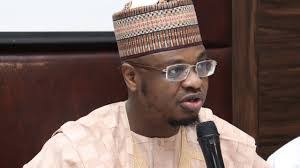The Federal Government has commenced training for workers in Ministries, Departments and Agencies (MDAs), to build their capacities towards attaining the digital transformation agenda of President Muhammadu Buhari.
Minister of Communication and Digital Economy, Dr Isa Pantami, said this at the opening of the phase two training for 400 participants from 100 MDAs for the Digital Transformation Technical Working Groups (DT-TWGs) in Abuja on Monday.
The theme of the training holding at the e-Government Training Centre is “Strengthening the Digital Economy Drive in Nigeria’s Federal Public Sector Using Galaxy Backbone’s Digital Services Platform”.
He explained that in prevailing digital economic era, government must treat digitisation as an integral part of governance in order to succeed and compete globally.
He emphasised that, digital governance was key to managing digital transformation successfully.
“The digital economy is developing at a remarkable rate and it has been widely accepted as the single most important driver of innovation, competitiveness and growth. It is now the highest driver of innovation and transformation in the public sector. The digital economy is fundamentally transforming the way the public sector operates and delivers services to customers to sustain our economy and compete globally. The failure of IT projects is also being experienced by a number of Federal Public Institutions (FPIs). This is largely due to the lack of appropriate digital governance structure either at the individual organisation level or government-wide. Digital Transformation Technical Working Group (DT-TWG) will be required to ensure all ICT and digital technologies related polices and regulations are adhered to by their organisation in a manner that enables national development”.
The Director General of Galaxy Backbone (GBB) Professor Mohammed Abubakar, said the beneficiaries were carefully selected with the aim of achieving the set target.
Abubakar urged them to use the knowledge gained by championing digital growth in their organisations towards economic growth.
“By virtue of responsibilities, you are to coordinate the implementation of the National Digital Economy Policy and Strategy (NDEPS), National e-Government Master Plan (NeGMP) and any digital transformation-related activities in the public sector at the federal level. You are to ensure that all IT projects are designed and implemented in accordance with the provision of the Nigerian Government Enterprise Architecture (NGEA) and the Nigeria e-Government Interoperability Framework (NeGIF)”.
Abubakar said since the public service was the engine room for the implementation of government policies and programmes, there was need to build the capabilities of public workers to deliver on government mandates.
“Due to roles expected from the beneficiaries in their organisations, we designed the contents, the learning objectives of the training with appropriate tasks to ensure effective class interactions, teaching and learning”.
He, however, expressed the belief that the training would be sufficient to guide the beneficiaries in making the right decisions and taking appropriate actions leading to successful digital transformation in their various organisations.
Mr Kashifu Inuwa, Director General, National Information Technology Development Agency (NITDA), said that the trainees will be trained in 12 areas including digital transformation, public sector perspective, gov.ng domain management and sensitisation among others.
He said the training included an examination and certification to ensure that the beneficiaries took active part in the event.
“I believe you are now in possession of basic skills and knowledge to carry out your responsibilities successfully in your various organisations. NITDA is there to support you on your journey towards digital transformation”.
Inuwa, however, said NITDA would ensure the training was a bottom-to-top approach for sustainable digital growth.
He urged the trainees to take back what they have learnt and champion digital transformation in their various organisations.
He also called on them to learn, unlearn and relearning skills so that they can maintain their jobs or secure new jobs with their new skills.
The programme was officially launched on August 27, 2020.

